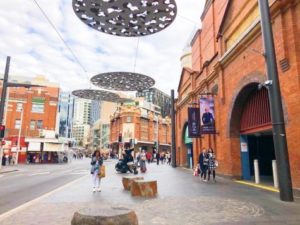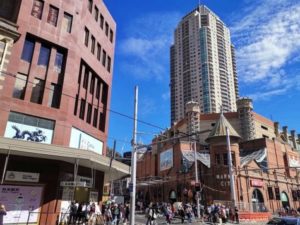First generation Chinese migrants living in the centre of Sydney may not prove to be big fans of Labor in the May 18 election. Their reasons are not only about the economy but also things beyond solid policies.
The middle class Chinese migrants’ voting preferences largely depend on tax policy, the economy and national development. White collar migrants living in the inner-city, these voters care more about their personal interests and the government’s financial policies. They check the parties’ policies in both English and Chinese so they know what’s happening and who they are voting for.
Financial analyst Michael Zhang, who became an Australian citizen in 2007, works as a financial analyst and lives in Barangaroo with his wife and two children.
“The first federal election after I became an Australian citizen, I voted for the Labor Party without a second thought,” he said. “I have been voting for the Coalition for years, and I also voted for them last month.
“I usually look at the tax related policy first; it’s the closet policy to me. We’ve all paid too much tax so the government’s budget proposal and tax cutting are good news and I wish it can be put into practice.”
Zhang said he was not satisfied with the NSW Coalition government’s urban construction plan but said “Labor’s proposal is way less reliable in both state and federal levels”.

He is not the only urban Chinese migrant to change his voting preference in this direction. In recent years Labor’s regularly shifting attitude towards Asian communities has caused dissatisfaction. Losing Chinese voters contributed to Labor’s defeat in the NSW election last month, extracting a hefty price for former Labor NSW leader Michael Daley’s Asian “stealing jobs” comments.
The traditional Chinese idiom “Three knives, two faces” was used as a large headline by the Australian Chinese Daily to describe Daley as a double dealer after his “anti-Asian remarks”. Daley was reported to give a Chinese media conference after securing the state party leadership last November in which he praised Chinese residents for “making the community better”.
But Labor’s loss of Chinese voters started long before Daley’s campaign disaster.
Traditionally, first-generation Asian migrants have embraced Labor for their positive attitude towards multiculturalism and immigration.
Jean Fang, a university worker from Ultimo, came to Australia after the 1989 Tiananmen Square Massacre. She and her husband were once firm Labor voters but her attitude towards the party has changed.
“I used to vote for Labor all the time. They treat migrants better, and I am still grateful for Bob Hawke’s open immigration policy at that time,” she said.
“But these days things have changed. Look at their racist campaign against Chinese investment in the state’s electricity network in 2015, and now this Michael Daley’s ‘Chinese PhD stuff’. I found them really fake in recent years.”

Surry Hills Chinese lesbian couple, copywriter Mercy Lynn and accounting professional Ally Zhu,, have also reassessed their attitudes to Labor.
Though not always a Coalition voter, Zhu decided she would vote Liberal in this federal election.
“The housing market is already in a downturn. If there is no negative gearing, it will greatly dis-incentivise investors. I don’t want to pay more capital gains taxes if I want to buy property in the future,” she said. “Besides, [the Coalition] are going to cut taxes. Even if the budget looks like a bribe for a vote in the upcoming election, I am bribed.”
Zhu also worries that Labor’s plan to increase the minimum wage is not practical and will lead to more tax evasion.
“I worked illegally before, for only $8 an hour. I know how these small business owners will respond to the minimum wage increase: more illegal workers.”
Her partner will continue to vote Labor but only because she feels she has no other choice.
“I can’t vote for a distant dream or battle cry. I vote for real things: how many taxes I’ll be paying and how can I get more convenient transport,” Lynn said. “Despite all that, I’ll still vote for Labor, not because I believe a single word they said but just because voting for the Greens won’t get them anywhere.
“So I have to hope that Labor can provide a safer world for us migrants.”


